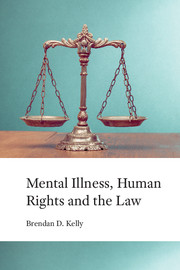Book contents
- Frontmatter
- Contents
- Foreword
- Preface
- Acknowledgements
- List of boxes
- List of legislation, treaties and conventions
- List of cases
- 1 Human rights and mental illness
- 2 Mental Health Acts 1983 and 2007: England and Wales
- 3 Fusing mental health and capacity legislation: Northern Ireland
- 4 Mental Health Act 2001: Ireland
- 5 The challenges of reform: Scotland
- 6 Structural violence, power and mental illness
- 7 Conclusions: fighting for rights
- Notes
- References
- Index
5 - The challenges of reform: Scotland
Published online by Cambridge University Press: 01 January 2018
- Frontmatter
- Contents
- Foreword
- Preface
- Acknowledgements
- List of boxes
- List of legislation, treaties and conventions
- List of cases
- 1 Human rights and mental illness
- 2 Mental Health Acts 1983 and 2007: England and Wales
- 3 Fusing mental health and capacity legislation: Northern Ireland
- 4 Mental Health Act 2001: Ireland
- 5 The challenges of reform: Scotland
- 6 Structural violence, power and mental illness
- 7 Conclusions: fighting for rights
- Notes
- References
- Index
Summary
This chapter begins with an overview of the Mental Health (Care and Treatment) (Scotland) Act 2003, which governs involuntary admission and treatment in Scotland. It is not intended as an exhaustive analysis of the content of the legislation or a ‘how to’ manual for practitioners, but rather as the basis for a consideration and analysis of recent mental health legislative reform in Scotland, with particular emphasis on human rights. Rather than assuming an approach rooted primarily in case law, this chapter focuses instead on the process of legislative reform, and examines not only the 2003 Act but also the Limited Review of the Mental Health (Care and Treatment) (Scotland) Act 2003 (Scottish Government Review Group, 2009) (the McManus Review) and the subsequent Mental Health (Scotland) Act 2015, which received Royal Assent on 4 August 2015. The chapter concludes with a consideration of the challenges of reform of mental health legislation in Scotland, and identifies themes or trends that may be transferrable to other jurisdictions, such as England, Wales, Northern Ireland and Ireland.
The Mental Health (Care and Treatment) (Scotland) Act 2003
Involuntary admission and treatment in Scotland is largely regulated by the Mental Health (Care and Treatment) (Scotland) Act 2003, which was significantly shaped by the report of the Millan Committee (2001), titled New Directions: Report on the Review of the Mental Health (Scotland) Act 1984. The key principles proposed by the Millan Committee are outlined in Box 5.1 and these, along with various specific recommendations, had a significant influence on the drafting of the 2003 Act.
The 2003 Act can be usefully examined from a human rights perspective under the following headings:
• principles and definition of ‘mental disorder’
• duties of various state actors
• emergency detention
• short-term detention
• compulsory treatment orders
• the Mental Health Tribunal for Scotland
• treatments for detained patients
• various other provisions.
- Type
- Chapter
- Information
- Mental Illness, Human Rights and the Law , pp. 132 - 170Publisher: Royal College of PsychiatristsPrint publication year: 2016



